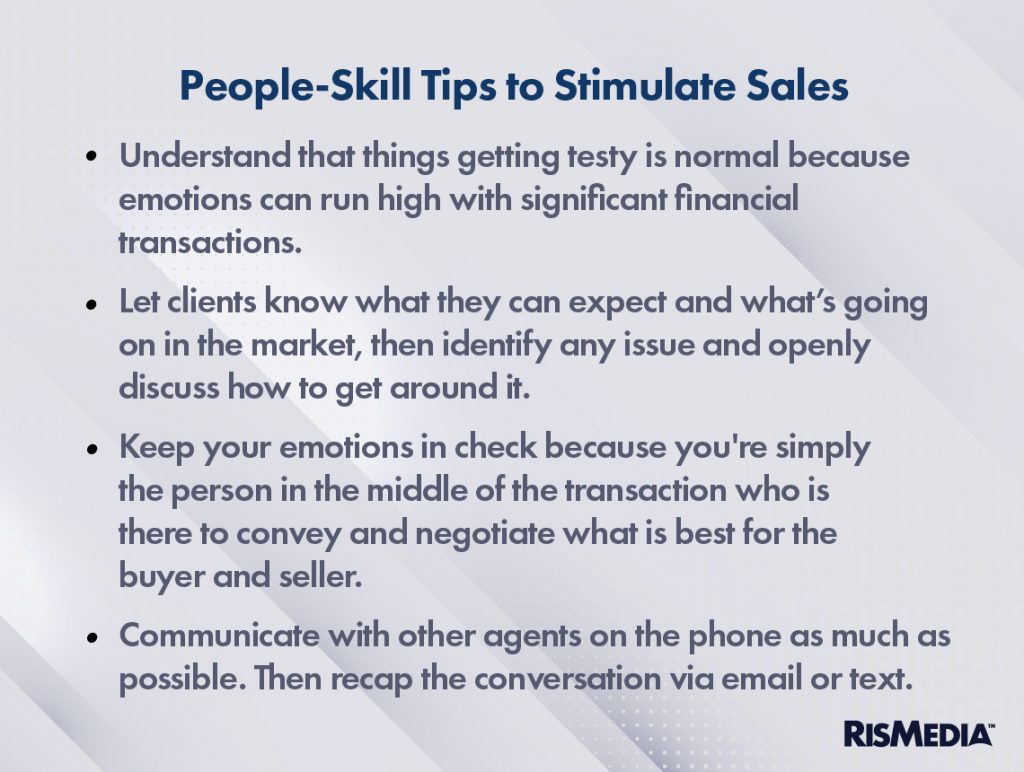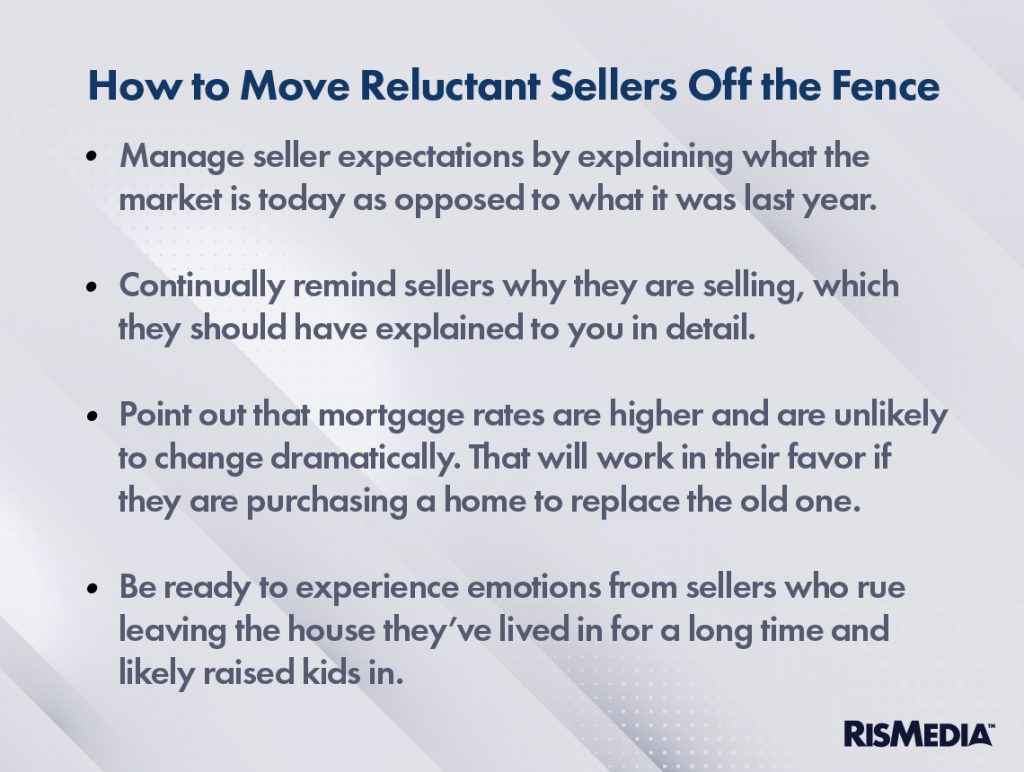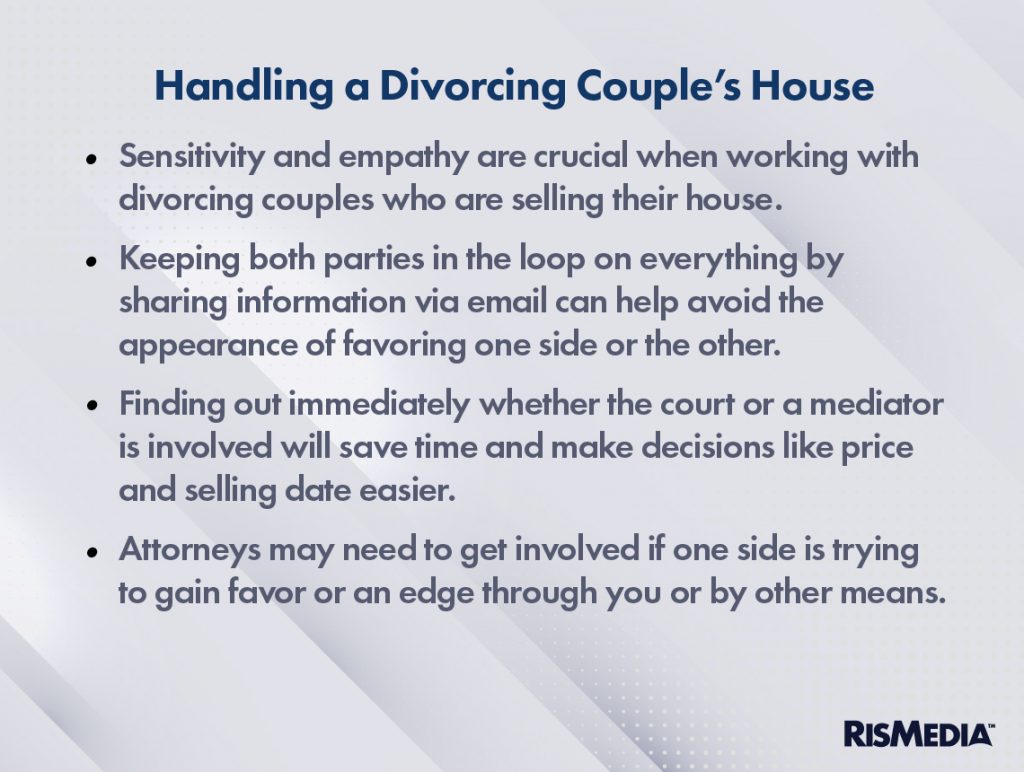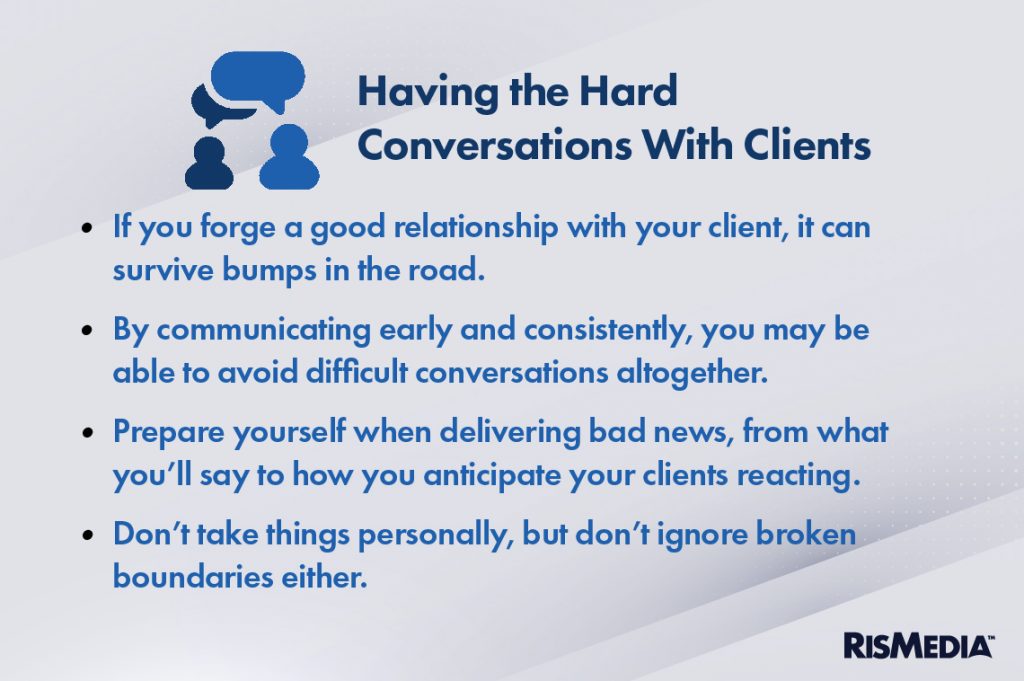People-Skill Tips to Stimulate Sales
The REALTOR® profession relies in great part on always exuding confidence and a happy countenance with clients, difficult though some of them may be as the market meanders through uncertain times. So it’s a challenge you’re facing, even if the basic buying and selling processes haven’t changed. You’ll likely need to adjust to it, because if you don’t bring home a sale, you don’t bring home a commission check.
“People want to buy a home, not be sold a home; there is a difference,” explains Jeffrey Decatur, a broker associate with RE/MAX Capital in Latham, New York. “There is so much confusing information out there…everyone thinks they’re an expert, and everyone has a different opinion,” he says. “People will quote various sources to support their point of view, positive or otherwise. What they need to understand is their local market, and consult with a trusted expert in that area.”
Longtime real estate executive Philip Gutman, president of PGutman, and managing director at The Continuum Company’s La Baia Bay Harbor, in Bay Harbor Islands, Florida, agrees that what’s most important in an agent-client relationship is relaying facts in a calm manner.
“Truthfully, a lot of agents don’t handle it properly,” he says. “When working with clients who are anxious or unhappy, you need to sit down, listen and try to find out exactly what the problem is. It’s important to come from a position of knowledge and reassurance. Let the client know what they can expect and what’s going on in the market. You need to identify any issue and openly discuss how to get around it. As an agent or broker, you’re responsible for using your market knowledge and expertise to help your client make the best decision possible. Listening to their concerns in a calm yet secure way is key.”
Louise McLean is a REALTOR® with RE/MAX Aerospace Realty, in Rockledge, Florida. She points out that not only must agents get along with buyers and sellers, but also with other agents who either have the listing or represent a buyer if it’s her listing.
“I’ve learned a thing or two about collaborating with other sales associates, as well as negotiating with buyers and sellers,” she notes. “One major point is that I needed to be neutral. The transaction wasn’t about me, it was about the buyer and seller. You don’t own the buyer or the seller; you communicate with them. You convey information so they can make the decisions.
“You have to take your emotions out of the sale. You’re simply the person in the middle of the transaction who is there to convey and negotiate what is best for the buyer and the seller. It’s an emotional decision for both parties, so you must stay calm. You can’t control the other agent, but you can control your reaction to him or her.” – Michael Catarevas
Key points
- Understand that things getting testy is normal because emotions can run high with significant financial transactions.
- Let clients know what they can expect and what’s going on in the market, then identify any issue and openly discuss how to get around it.
- Keep your emotions in check because you’re simply the person in the middle of the transaction who is there to convey and negotiate what is best for the buyer and seller.
- Communicate with other agents on the phone as much as possible. Then recap the conversation via email or text.
“People want to buy a home, not be sold a home; there is a difference.”
–Jeffrey Decatur, broker associate, RE/MAX Capital
To read the full article, click here.
How to Move Reluctant Sellers Off the Fence
Times have certainly changed from even just six months ago, when sellers enjoyed bidding wars and could pick and choose just the right buyer. Now, with mortgage rates having doubled and economic uncertainty in the air, you’ve got your work cut out for you.
“Many sellers are reading media headlines but don’t understand how the news impacts their sale until they are on the market,” says Lauren Walz, an agent with the Dawn McKenna Group in Hinsdale, Illinois. “It is important to show them how buyers’ expectations and buying power has changed, through data and statistics. Say a property was sold prior to a mortgage-rate hike. To make a comparable home affordable to the same buyer now, you must reduce the price to account for the additional monthly costs of the higher rate. It is also important to remind sellers of why they are selling. Most often, selling a house is not a 100% financial decision. When sellers keep in mind their ‘why,’ they are likely to sell for market value.”
Julie Fisher, a REALTOR® with Crye-Leike Real Estate Services in Chattanooga, Tennessee, seconds those thoughts, adding that “talking with sellers about the current market is a key piece of communicating with your clients and affirming their frustration that home prices may not be what they were recently. We hear on the news about the declining housing market, and it has been making an adjustment, but it is an important conversation to have with sellers as to what that adjustment is in their area, even paring that down to market conditions in specific neighborhoods.”
When Christine Stucke, a sales associate with Berkshire Hathaway HomeServices Fox & Roach, REALTORS® in Turnersville, New Jersey, encounters sellers who rue missing out on the bidding-war frenzy of early 2022, she puts an immediate stop to it.
“I am very forthcoming with my clients in any market and find it best to be realistic in order to avoid potential disappointment,” she says. “I manage their expectations in a manner that results in what a market is versus what a market was. Research and supporting stats help to relay a view of where their home will fit in today’s market with not only the decrease we see in offers, but the decrease in the buying power of the people actively looking.”
“Regardless of age, people don’t tend to be serious about their move until they are happy about where they are going,” notes Deb Dorsey, a sales associate with Berkshire Hathaway HomeServices Fox & Roach, REALTORS® in Rosemont, Pennsylvania. “If it is truly the right time for the seller, they have to come to the decision on their own. It’s bad practice to push them. There will be people who just need more time.” – Michael Catarevas
Key points
- Manage seller expectations by explaining what the market is today as opposed to what it was last year.
- Continually remind sellers why they are selling, which they should have explained to you in detail.
- Point out that mortgage rates are higher and are unlikely to change dramatically. That will work in their favor if they are purchasing a home to replace the old one.
- Be ready to experience emotions from sellers who rue leaving the house they’ve lived in for a long time and likely raised kids in.
“Many sellers are reading media headlines but don’t understand how the news impacts their sale until they are on the market.”
– Lauren Walz, agent, The Dawn McKenna Group
To read the full article, click here.
Talks to Have With Clients in a Shifting Market
While an agent must acknowledge the realities of the current market, how you talk about real estate can make all the difference for your business. Regardless of what your market looks like, or what has worked for you in the past, now is the time to start thinking about your pitches, presentations and everyday conversations about the industry.
For some, the instinct might be to avoid talking about the less sunny side of real estate developments—rising mortgage rates, slowing price appreciation and other headlines popping up in the national media. But ignoring those things won’t make them go away, and potential clients are likely looking for answers rather than empty assurances.
In the end, it’s not these stats and headlines that are the problem. It’s how they are framed in the minds of consumers, often without context or overly focused on short-term negatives. Now is the time to be the most up-to-date, and bring the most historic, personal and relevant data to conversations about real estate, according to Heather Maddox, a broker with Windermere Real Estate.
“Most of my buyers and sellers are not looking at real estate every single day; they’re not trying to time this market,” she says. “They’re buying and selling because it fits their life; they need to. They look to me for guidance when it comes to what’s going on in the market. There’s always a positive approach to what’s happening. This market is good for somebody—every market is good for somebody.
“You could have bought last year, but you would have paid 20% over asking and waived all your rights. Now you can negotiate down a little bit, maybe get some seller credit. So the same house is not that different when you lay it out that way.”
Kristine Milkovich, co-owner of the Milkovich Team with John L. Scott Real Estate, says that she “leads by example” to show her agents how to be a rock for clients in what might seem like turbulent times.
“We talk about the fear that this is causing in our clients, and it is our job to be there for them, to guide and support them to create a sense of safety. We don’t have all the answers. We don’t have a crystal ball, but we can help execute a plan, and I think that’s something that we really tap into in our team,” she describes. “The No. 1 thing is, when times are lean, I want agents to remember that you are a ‘well-paid problem-solver.’ Be really, really good at solving problems for people, and caring about them.”
Having those conversations with agents at regular meetings, and preparing them to remain focused on these fundamental duties allows her team to “weather the storm,” Milkovich says, with consistency and success. The “general human nature” is to respond to the current uncertainty with fear, she says, but that creates an opportunity for agents and brokers to stand out—to remain confident (not prescient), and demonstrate their deeper understanding of housing when every other voice is shouting panic and mixed messages.
“The more that we, as real estate brokers, can put ourselves into that consumer lens—I think that’s the overriding thing, is just being a source of hopefulness,” says Milkovich. “It’s not about brushing the facts under the rug, but just really being that guide and that coach and letting people know that when it is the right time for them, we’re here.”
Without generalizing too much, buyers today are often fearful of a 2008-esque crash, while many sellers will become distraught if their home isn’t selling at 2021 speed and price-levels. These intense emotions can make the real estate relationship difficult, requiring a lot of attention, understanding and patience from the agent. – Jesse Williams
Key points
- There are plenty of ways to speak facts without being negative, or sweeping issues under the rug.
- Understanding new fears or frustrations will be critical, for you and your team.
- Bring concrete data and history, but don’t forget your other strengths and assets.
- Sharing personal stories has never been more important.
“The No. 1 thing is, when times are lean, I want agents to remember that you are a ‘well-paid problem-solver.’ Be really, really good at solving problems for people, and caring about them.”
-Kristine Milkovich, co-owner of the Milkovich Team, John L. Scott Real Estate
To read the full article, click here.
Handling a Divorcing Couple’s House
Your non-stop networking efforts paid another dividend! You’ve been recommended by a friend and previous client to a couple selling their co-owned house. The only downer is that they’re divorcing and barely communicating. It can be a slippery slope, especially for a newer REALTOR®, and you will for sure earn your commission with this one.
“The most important thing when a divorce situation arises is to approach it with tremendous sensitivity and empathy to what’s going on,” says Alexander Chingas of the Bross Chingas Bross Team at Coldwell Banker Realty in Westport, Connecticut. “Most times you’re helping people sell a house for happy reasons. They’ve been planning or looking forward to relocating somewhere, or it’s time to trade up or trade down as part of accomplishing a broader set of goals.
“But with divorces, it’s often families that didn’t want to be in this situation, and can be further complicated if one spouse wanted to hold onto the property but that’s not feasible, or a court decided that wasn’t going to happen. You never know what you’re getting into, so you have to just listen, read the room and figure out how you can best serve their needs at one of the most sensitive times people could be selling a property.”
Jeffrey Decatur is a broker associate with RE/MAX Capital in Latham, New York. With 28 years of real estate experience, he’s handled the sale for divorcing homeowners many times, and follows one absolute-must rule.
“It can be very tricky,” he admits. “The thing with people getting a divorce and selling their house is, you have to make sure one side doesn’t think you’re favoring the other side. What I always do is put everything in every email, and cc everyone in every correspondence. Period. End of statement. Because if one side finds out that you talked to the other side and said something they don’t know about, it opens the door to a lack of trust. Then it’s, ‘What else don’t I know about?’”
Both agents agree that it is vital to ask a lot of questions during the initial consultation in order to ascertain as many details as possible before moving forward.
“You have to empathize with everyone, but in doing so, you have to ask intelligent questions in order to figure out next steps,” says Chingas. “Very often, depending on where they might be in the divorce process, couples may be governed by decisions that a judge or a mediator has already made, specifying the time by which the property must be listed, or price targets, rather than leaving it up to the two individuals who maybe can’t agree on much between themselves. Going through all of that with them, and what the process is going to look like, is important.”
Chingas admits that selling a house for people divorcing takes a lot more work on his end, mostly because of the extra time he needs to spend going over everything twice, once with each side, but it’s all part of the business.
“Very often the homeowners are not communicating with one another and don’t want to be together when meetings take place,” he says. “And yet, they want to be involved and heard throughout the process. So as the REALTOR®, you have to be willing to have two sets of meetings. Being accommodating and giving them the whole of your time can go a long way toward keeping things productive and respectful.”
While it extends the process, Chingas notes that having the divorce proceedings and details in court, with a judge making rulings, can simplify things for all concerned.
“Very often the court will direct that the real estate broker submit a property analysis, and then there may be a separate appraisal, after which they average the figures to establish a list price,” he explains. “Then if an offer is received within a certain percentage of the average, it must be accepted or negotiated.”
Most of the time, the agents agree, both sides do want the top price for the house because they will split the proceeds. – Michael Catarevas
Key points
- Sensitivity and empathy are crucial when working with divorcing couples who are selling their house.
- Keeping both parties in the loop on everything by sharing information via email can help avoid the appearance of favoring one side or the other.
- Finding out immediately whether the court or a mediator is involved will save time and make decisions like price and selling date easier.
- Attorneys may need to get involved if one side is trying to gain favor or an edge through you or by other means.
“As the REALTOR®, you have to be willing to have two sets of meetings. Being accommodating and giving them the whole of your time can go a long way toward keeping things productive and respectful.”
-Alexander Chingas, Coldwell Banker Realty
To read the full article, click here.
Having the Hard Conversations With Clients
Convincing a seller or buyer to choose you as their real estate agent can be challenging, but the real work begins once they’re officially your client. You have to maintain that relationship, and it’s not always easy to do so. Part of nurturing those relationships entails keeping the lines of communication open in order to have the tough conversations that may present themselves along the way. What are the frequent, and often difficult, conversations real estate professionals are having with their clients these days?
The “two Ps–price and possession” are a frequent topic these days, says Scott Beedon, a Fathom Realty REALTOR® and district director based in Port Huron, Michigan.
Rose Sklar, an agent with Coldwell Banker Realty based in Weston, Florida, and founder of the Sklar Team, has had to give many of her clients a reality check in regard to the fact that the pandemic-fueled boost to the market is over. But what must be done during the most difficult moments of communication in order for real estate professionals to come out of the conversation with their business relationships intact?
If you make your role clear with your client, you will avoid confusion and miscommunication or potential disputes down the line. That’s exactly what Dyan Pithers, co-owner of the Pithers Group at Coldwell Banker in Tampa, Florida, believes.
“When the relationship first begins, there’s a little bit of confusion about the real estate professional’s role. Our role is to provide real estate services, to draw on our many years of experience, to provide tangible and intangible experience to the buyer and the seller.”
Stephanie Erhueh, managing broker of Long & Foster Real Estate’s offices in Waldorf and Tapestry, Maryland, concurs.
“Sometimes agents get excited because we have a new client and it’s off to the races, but there are some conversations that need to happen so that everybody’s on the same page. If you’re doing that properly on a recurring basis, it stymies difficult conversations that come up down the road.”
So, how should you define your role to clients? Sklar has a simple outlook she shares with buyers and sellers alike: “You’re the boss, but I’m the expert.”
While hard conversations can be preemptive, Shannon Murree—a real estate professional with RE/MAX Hallmark Chay Realty in Barrie, Ontario—is always upfront with her clients. “When they ask me a question, I’m point blank with them. ‘Do you want me to tell you what you want to hear, or do you want me to tell you the truth?’”
When you’re preparing your seller for staging and open houses, some advice can be hard to hear. In fact, Pithers says that some of the hardest conversations she’s ever had with clients centered around updating their home to make it more presentable for buyers.
“Food and animal scents can be a real problem and a very touchy subject to address. So can eclectic or outdated decor in connection with the home. Sometimes we deal with hoarding, and we have to gently let people know there’s just a lot of clutter.”
Buyers may also need advice on proper behavior. “There’s been a time where we’re negotiating a purchase and my client shows up in their fancy new car. Don’t do that!” explains Murree.
Few things test a relationship’s strength like bad news. Every agent can probably recount a time when they had to break bad news, whether it’s telling your client their bid for the listing was lost or, on the flip side, the buyer retracted their offer.
Beedon has had bad news beyond a sale going wrong. “We lost a family on a family vacation in a highway accident, so we had to sit down and understand what’s going on with the house and the heirs. It’s not just the ‘deal blew up,’ ‘the buyer lied on their application’ or ‘the seller decided they’re not going to move.’” – Devin Meenan
Key points
- If you forge a good relationship with your client, it can survive bumps in the road.
- By communicating early and consistently, you may be able to avoid difficult conversations altogether.
- Prepare yourself when delivering bad news, from what you’ll say to how you anticipate your clients reacting.
- Don’t take things personally, but don’t ignore broken boundaries either.
“Our role is to provide real estate services, to draw on our many years of experience, to provide tangible and intangible experience to the buyer and the seller.”
-Dyan Pithers, co-owner of the Pithers Group, Coldwell Banker
To read the full article, click here.








